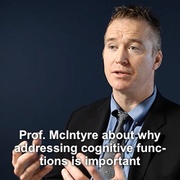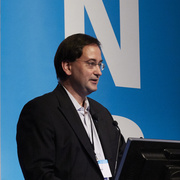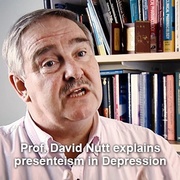
Choose a channel
Check out the different Progress in Mind content channels.

Progress in Mind





Mood disorders are a leading cause of disability, yet many are highly treatable. To choose the best possible management plan for patients and to plan service provision effectively, it is important to know which patients are at risk of hospitalization and understand the factors that may affect length of stay (LOS) and readmission.
Speaking at an APA session in May 2016, Dr John Goethe of Hartford Hospital in Connecticut, reported the findings of a study of over 12,500 hospitalized patients with mood disorders discharged between 2000 and 2013, which looked at predictors of prolonged LOS and later readmissions. Two thirds of the sample had MDD and readmission was assessed at various time-points after the index admission – 1, 3, 6 and 12 months post-discharge.
A number of potential predictors of long LOS (greater than 9 days) and readmission were examined: presence of psychotic features; being on more than 2 psychotropic drugs; and co-occurrence of other psychiatric conditions, namely bipolar disorder, substance use disorder (drugs and alcohol) and PTSD.
Dr Goethe reported that at the 12-month time-point, 22% of patients with MDD and 24% with bipolar had been readmitted. In terms of LOS for these mood disorders, stays were longer for bipolar disorder than for MDD. He said that having psychotic features with MDD increased the 30-day readmission rate to 11% compared with 7% in patients without psychotic features. Similarly, patients receiving more than 2 drugs for their condition, or having co-occurrent PTSD were more likely to be readmitted at any time during follow-up. In MDD, alcohol use appear to have a protective effect at the 1 month time-point in MDD, reducing readmission rates, but this effect was lost with continued follow-up.
In terms of LOS, psychotic features with MDD and multiple therapies increased LOS, while co-occurrent PTSD reduced LOS.
In the same APA session, delegates heard the findings of two meta-analyses that assessed the types of patients with mood disorders included in randomized, placebo controlled trials (RCTs) in the past 20 years. Professor Mark Zimmerman, Professor of Psychiatry at Brown Medical School, Rhode Island said that a review of antidepressant trials in patients with MDD, which included 170 different studies published in the past 15 years, shows that most of the MDD patients seen in routine practice would be very unlikely to meet the entry criteria. For example, patients with MDD were typically excluded from RCTs for having depression diagnosed for more than 2 years, multiple episodes, for having co-occurrent axis I diagnoses and for suicidality.
According to Professor Zimmerman, this means that at least 40% of the MDD patients seen in routine practice would not be eligible to take part in an RCT of an antidepressant therapy.
The same exercise looking at RCTs in bipolar disorder, also highlighted that patient cohorts are restricted and unrepresentative of real-world patient populations.
Professor Zimmerman conceded that the nature of regulatory studies requires assessment in homogeneous patient populations but he lamented that there is consequently a dearth of real-world data on the effectiveness of treatments in the highly heterogeneous and complex patients actually encountered in everyday practice.
Sign-up for our newsletter and get our APA highlights report.
A highly heterogeneous group of patients come under the umbrella of mood disorders.







People suffering from mental illness need to know that they are worth it – to be empowered and have self-esteem. The 2016 EPA symposium on overcoming the stigma of mental illness updated us on work to tackle this pervasive problem.
While progress is evident and inspiring, we need much more. Prof Wolfgang Gaebel (Heinrich-Heine-University, Dusseldorf), and President of the EPA, reminded us that if we don’t do anything, nothing will be done, and things will stay the same.
‘The stigma of mental illness is still the main obstacle to the development of mental health services and a heavy burden for all touched by mental illness’ Prof Wolfgang Gaebel
Self-stigma is believing the stereotypic or stigmatising views about you are true. It reduces empowerment, self-esteem, self-efficacy. Both stigma and self-stigma impact quality of life. People avoid seeking help and get stuck in a hopeless situation. Empowerment – the sense of self-realisation – allows people to overcome their powerlessness and motivates them to pursue a better future.
There are a number of actions and strategies against different levels of stigma – social, institutional and self-stigma. These actions target knowledge, attitudes and discriminative behaviour. However, the evidence for effective anti-stigma interventions addressing people with mental health problems is scarce.
Prof Gaebel presented the first results from the STEM study. This is the first randomised controlled trial to test psycho-educational therapy addressing stigma-coping and empowerment in patients with depression and schizophrenia. The trial, carried out in different health care settings in Germany, involved two groups:
Intervention: regular psycho-education (8 sessions) and stigma-coping and empowerment (3 sessions plus 1 booster session).
Control: regular psycho-education (11 sessions plus 1 booster session).
The main endpoint was the long-term improvement of perceived quality of life (WHO-QOL) compared to the control group. More than 300 patients (65%) completed the 12-month follow-up. Three-quarters of the patients had depression, and a quarter had schizophrenia.
Overall, as well as in the depressed subgroup, there was no difference between the intervention and control arms in WHO-QOL at 12 months. In the schizophrenia group, there was in fact a non-significantly higher WHO-QOL among controls. These results are surprising.
The statistical analysis is still in progress and no definitive conclusions have been drawn.
Possible reasons for lack of effect may be that the intervention and control groups were actually managed in a very similar way– only 4 of the 12 sessions addressed different topics (i.e. included empowerment). Also, the good standard of basic treatment in both groups might make it difficult to see an intervention effect.
Prof Sara Evans-Lacko (London School of Economics and Political Science), described the current state of research on social exclusion and stigma in Europe.
Literature mapping was used to select relevant articles published between 2007 and 2012 - 810 articles were included in the analysis. The patients in these studies suffered from a range of mental disorders including depression and schizophrenia. By far, most of the articles were from the UK, followed by Germany and the Netherlands. Very few came from Eastern European countries. The research was primarily in detection, screening and diagnosis.
Her conclusion is that despite growing interest in this field, there is still little research looking specifically at ways of protecting against and reducing stigma and promoting resilience and social inclusion.
Prof Yoram Cohen, Acting President of Global Alliance of Mental Illness Advocacy Networks (GAMIAN)-Europe asked the question: seven years after ratification of the United Nations Convention on the Rights of Persons with Disabilities (UNCRPD), are there any advances for patients with mental health conditions?
The UNCRPD is a beacon of light to follow. It recognises that discrimination based on disability is a violation of the person’s inherent dignity and worth. The contributions made by persons with disabilities to the overall well-being of their communities are valuable. And autonomy and independence for persons with disabilities, including the freedom to make their own choices, are important.
Despite the ideals proclaimed in the UNCRPD, care in many mental health facilities around Europe is still of poor quality and in some cases may hinder recovery.
The misconception that people with mental health problems are not able to take responsibility, manage their affairs and make decisions about their lives contributes to ongoing marginalisation in their communities.
Bert Johnson, President of EUFAMI – the European Federation of Associations of Families of People with Mental Illness – highlighted the harsh reality of stigma and the fact that it goes to the heart of what it is to be human.
Families also suffer from stigma. The Caring for Carers (C4C) survey assessed the experiences of family members caring for their relative with severe mental illness from a number of countries. A third of carers reported that they are treated differently because of the mental illness of the person they care for. People felt reluctant to invite guests to their home and withdrew from relationships.
The recommendations to counter stigma are common sense, Mr Johnson told the audience – but it is putting them into practice that counts. These include education about mental health and the care required, and raising public awareness of the impact of mental illness on families.
The stigma of mental illness is a major challenge for patients and their families.